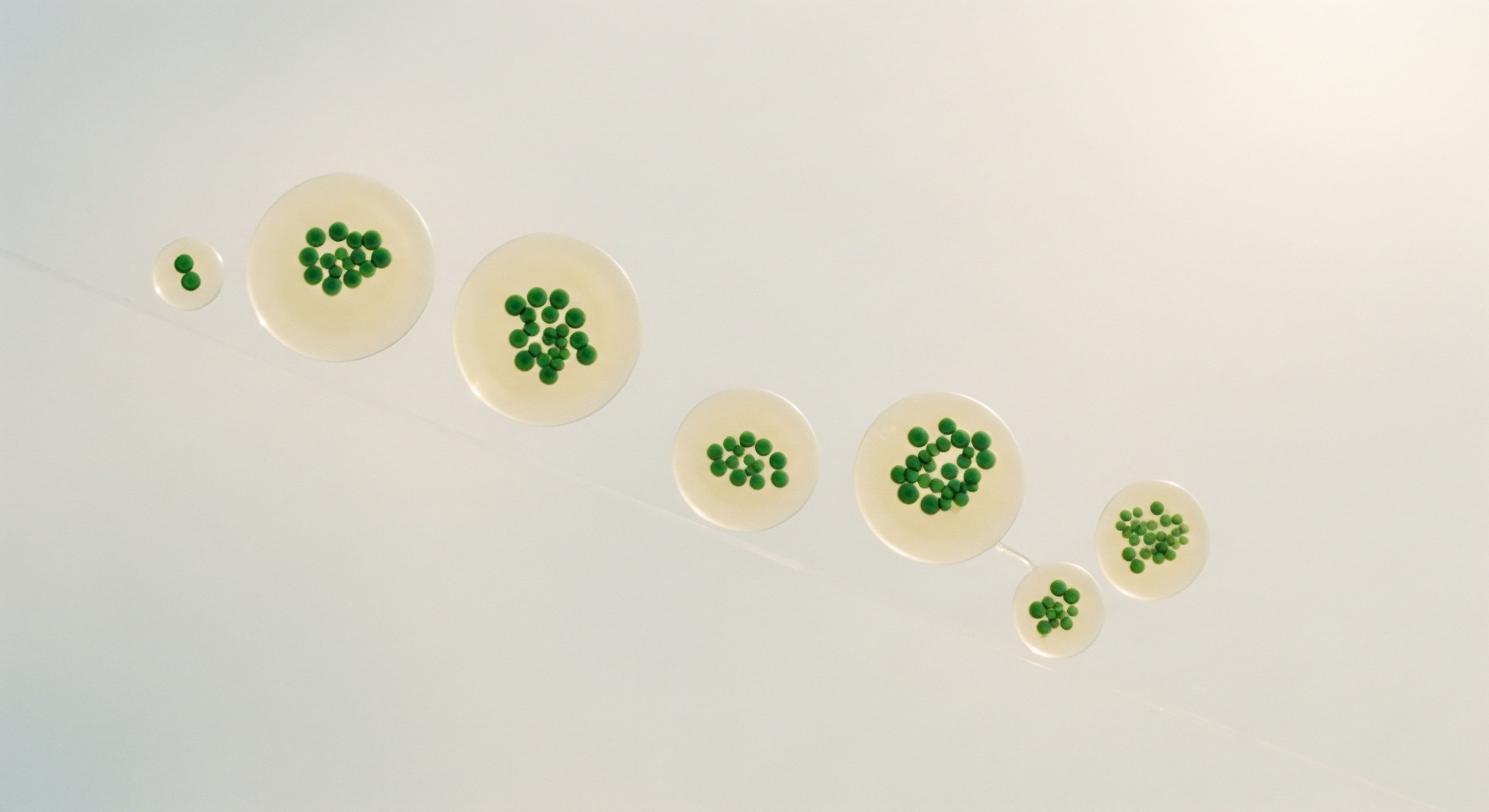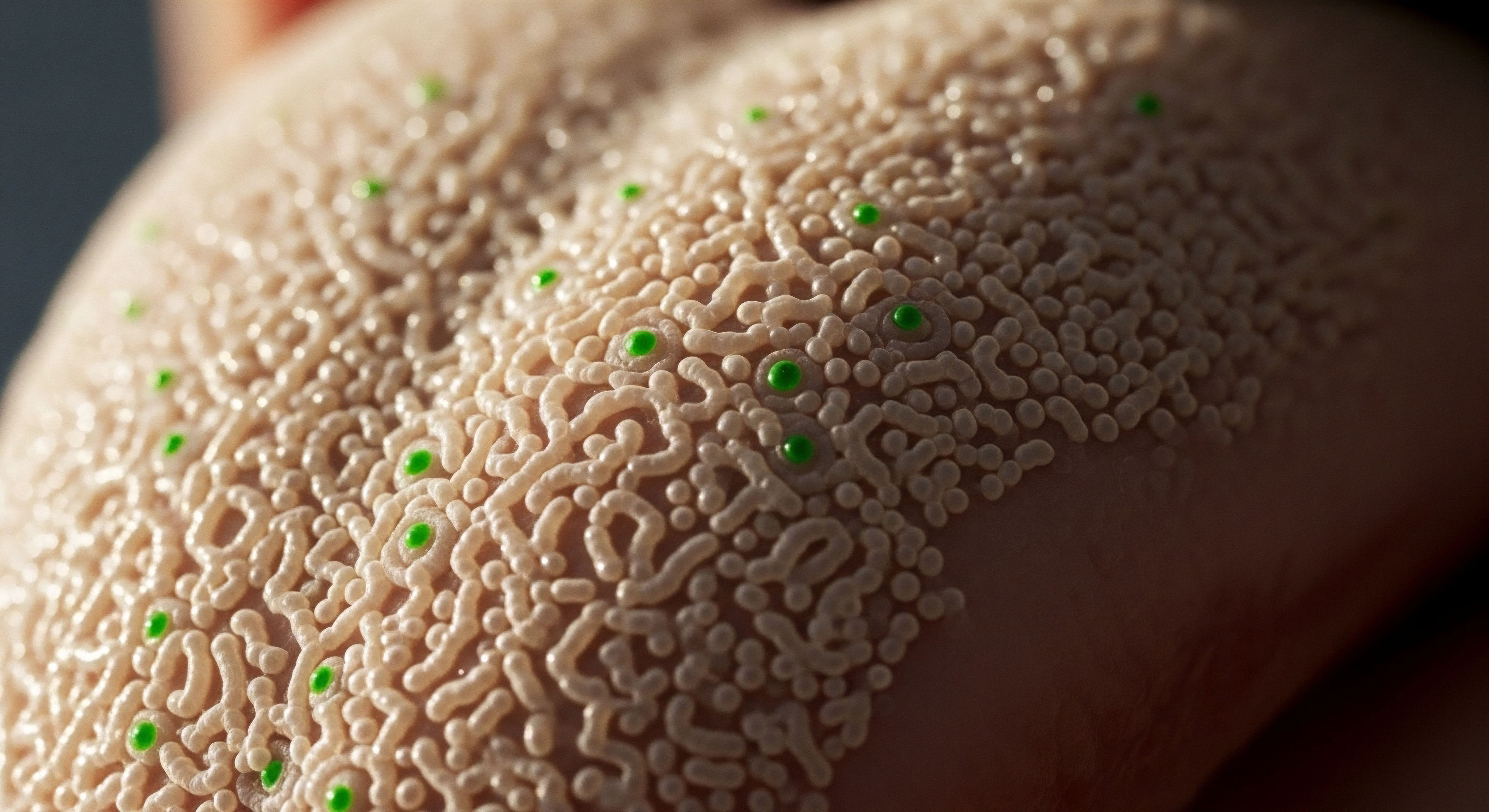

The Molecular Spark of Inner Power
The prevailing narrative often casts cholesterol as a metabolic antagonist, a silent threat lurking within our vascular architecture. This perspective, while rooted in specific health concerns, obscures a profound biological truth ∞ cholesterol is a foundational molecular spark, an indispensable precursor for the very hormones that sculpt our drive, define our cognitive acuity, and fuel our relentless pursuit of peak performance.
To truly master one’s vitality, one must first comprehend this molecule’s indispensable role, recognizing it as an internal resource for ambition, a biochemical catalyst for the human spirit.
Every cell in the human body relies on cholesterol for structural integrity and signaling. Beyond its cellular scaffolding function, cholesterol orchestrates the symphony of steroidogenesis, the intricate process that synthesizes life-affirming hormones. Testosterone, estrogen, cortisol, and vitamin D ∞ these critical regulators of mood, energy, muscle mass, bone density, and stress response ∞ all begin their journey as a cholesterol molecule. A robust, balanced cholesterol metabolism underpins the entire endocrine system, enabling it to operate at its highest potential.
Research indicates that approximately 80% of the body’s cholesterol is endogenously produced, primarily in the liver, underscoring its intrinsic biological importance beyond dietary intake.
The brain, a command center for motivation and cognitive function, holds a significant portion of the body’s cholesterol. It is essential for myelin sheath formation, insulating nerve fibers and facilitating rapid neural transmission. Synaptic plasticity, the brain’s ability to form and strengthen connections, relies on adequate cholesterol levels.
This direct link to neural health means that cholesterol profoundly influences memory, learning, focus, and the very neurochemical pathways that generate drive and resilience. Diminished cholesterol availability within the central nervous system can impede optimal brain function, blunting the sharp edge of cognitive performance and dulling the internal fire that propels us forward.
Our capacity for stress adaptation, a cornerstone of sustained high performance, finds its origins in cholesterol. Cortisol, often mischaracterized as solely a “stress hormone,” plays a vital role in regulating metabolism, inflammation, and immune function, enabling the body to respond effectively to challenges.
Without a sufficient supply of cholesterol, the adrenal glands struggle to produce optimal levels of cortisol, leading to a compromised stress response and a diminished ability to maintain equilibrium under pressure. This impacts not only physical endurance but also mental fortitude, making the individual more susceptible to burnout and a decline in overall drive.
The synthesis of vitamin D, a hormone critical for immune function, bone health, and even mood regulation, commences with cholesterol in the skin, activated by sunlight. This cascade illustrates how deeply interconnected our biological systems are, with cholesterol serving as a master key unlocking multiple pathways to enhanced vitality.
Understanding this fundamental truth transforms our perception of cholesterol, elevating it from a simple lipid to a pivotal component of our physiological engine, directly influencing our capacity for a driven, high-performing existence.


Unlocking the Endocrine Blueprint
Optimizing cholesterol’s role in igniting inner drive involves a sophisticated, multi-faceted approach, moving beyond simplistic dietary restrictions to embrace a holistic understanding of metabolic health. The goal is to cultivate an internal environment where cholesterol is efficiently utilized as a building block for vital hormones and robust neural function. This strategic optimization requires precision, informed by both biochemical pathways and lifestyle interventions, effectively recalibrating the body’s intrinsic engine.
The initial step involves understanding the intricate dance of cholesterol transport and utilization. Low-density lipoprotein (LDL) and high-density lipoprotein (HDL) are not inherently “good” or “bad” entities; they are critical transport vehicles. LDL delivers cholesterol to cells for hormone synthesis and membrane repair, while HDL scavenges excess cholesterol, returning it to the liver.
A healthy balance and optimal particle size within these lipoproteins facilitate efficient steroidogenesis and cellular function. Targeted interventions focus on enhancing the functionality of these transport systems, ensuring cholesterol reaches its metabolic destinations without impedance.
Optimal cholesterol metabolism is a cornerstone of endocrine health, with studies demonstrating a direct correlation between healthy lipid profiles and robust steroid hormone production.
Dietary strategies play a pivotal role. A focus on nutrient-dense, whole foods provides the necessary cofactors for cholesterol metabolism and hormone synthesis.
- Healthy Fats: Incorporate monounsaturated and polyunsaturated fats from sources like avocados, olive oil, nuts, and fatty fish. These support overall lipid health and provide essential fatty acids that modulate inflammatory pathways.
- Lean Proteins: Ensure adequate intake of high-quality protein to support enzyme production and cellular repair, both crucial for metabolic efficiency.
- Fiber-Rich Foods: Soluble fiber, found in oats, beans, and fruits, aids in the excretion of bile acids, prompting the liver to utilize more cholesterol for new bile acid synthesis, thereby supporting healthy cholesterol levels.
- Micronutrient Abundance: Vitamins B5, B6, C, and E, along with minerals like zinc and magnesium, act as essential cofactors in various steps of hormone synthesis and cholesterol metabolism.
Beyond diet, lifestyle interventions significantly impact cholesterol’s efficacy. Regular, strategic exercise enhances mitochondrial function, improving the body’s ability to convert cholesterol into energy and hormones. Both resistance training and high-intensity interval training (HIIT) have demonstrated positive effects on lipid profiles and hormonal balance. Prioritizing deep, restorative sleep is equally crucial; sleep deprivation disrupts circadian rhythms and elevates stress hormones, which can impair cholesterol’s conversion into beneficial compounds.
Stress management techniques, including mindfulness, meditation, and structured relaxation, directly influence the hypothalamic-pituitary-adrenal (HPA) axis. Chronic stress diverts cholesterol towards excessive cortisol production, potentially depleting precursors for other vital hormones like testosterone and DHEA. Mastering stress response preserves cholesterol for its broader endocrine functions, maintaining a balanced hormonal milieu essential for sustained drive and cognitive clarity.
Advanced optimization protocols may involve targeted supplementation under expert guidance. Specific nutrients like berberine, red yeast rice, and plant sterols can modulate cholesterol absorption and synthesis pathways. Certain peptides, such as those influencing growth hormone release, can indirectly support metabolic health and the efficient utilization of cholesterol. These interventions are precise tools, deployed after comprehensive biomarker analysis, to fine-tune the body’s internal chemistry and ensure cholesterol serves its highest purpose ∞ fueling an optimized, driven existence.


Timing the Metabolic Recalibration
The strategic timing for assessing and optimizing cholesterol’s role in driving human performance is a dynamic consideration, evolving across the lifespan and in response to specific physiological demands. It extends beyond routine annual check-ups, demanding a proactive stance informed by an understanding of life stages, performance goals, and emerging physiological signals. This approach ensures that cholesterol consistently functions as an accelerator for inner drive, not a metabolic impediment.
Early assessment provides a crucial baseline. Establishing a comprehensive lipid panel, including advanced markers like LDL particle number and size, in early adulthood offers a foundational understanding of an individual’s metabolic predispositions. This proactive data collection allows for early lifestyle adjustments, preventing the gradual accumulation of imbalances that can compromise hormone synthesis and cognitive function in later years. The goal is to establish optimal metabolic health before significant challenges emerge, preserving the molecular integrity essential for sustained drive.
Periods of heightened demand or transition represent critical windows for intervention. Athletes undergoing intense training cycles, executives navigating high-stress projects, or individuals experiencing significant life changes all place increased demands on their endocrine systems. During these times, the body’s need for cholesterol as a precursor for stress hormones and performance-enhancing compounds escalates.
Monitoring cholesterol and related hormone levels becomes paramount, allowing for timely nutritional and lifestyle adjustments to support the body’s adaptive capacity and prevent depletion of the vital resources that fuel drive and resilience.
The natural progression of aging presents another compelling timeline for focused attention. As individuals advance through their 30s, 40s, and beyond, a gradual decline in endogenous hormone production often occurs. This age-related shift necessitates a more vigilant approach to cholesterol metabolism.
The body’s efficiency in converting cholesterol into vital hormones can diminish, impacting energy levels, cognitive function, and overall vitality. Strategic interventions, including dietary modifications, targeted supplementation, and potentially hormone optimization therapies under expert supervision, become instrumental in maintaining robust endocrine function and sustaining inner drive as the years progress.
Recognizing subtle physiological cues also dictates the “when” of metabolic recalibration. Persistent fatigue, unexplained weight gain, diminished libido, reduced mental clarity, or a noticeable decrease in motivation are all potential indicators that the intricate balance of cholesterol and hormone synthesis may be compromised.
These signals warrant immediate, in-depth investigation, moving beyond superficial symptom management to address the underlying biochemical architecture. A comprehensive assessment, including advanced lipid panels, hormone profiles, and inflammatory markers, guides precise interventions designed to restore optimal function and reignite the molecular spark of inner drive.
The “when” is therefore not a fixed point, but a continuous cycle of assessment, adaptation, and optimization. It requires an individual to become a diligent steward of their own biological machinery, proactively monitoring key indicators and implementing precise strategies to ensure cholesterol consistently serves its purpose as a fundamental building block for a life defined by unwavering drive and peak performance. This continuous engagement with one’s metabolic landscape represents the pinnacle of self-mastery.

The Relentless Pursuit of Biological Mastery
The journey to unlock and sustain peak inner drive ultimately culminates in a profound understanding of our own biological machinery. Cholesterol, often relegated to the shadows of health concerns, emerges as a radiant cornerstone, a molecular blueprint for ambition itself.
We move beyond simplistic fears, embracing the nuanced truth of its essential role in orchestrating the very hormones that define our vigor, sharpen our intellect, and ignite our will. This insight transforms our approach to health, shifting from reactive management to proactive mastery.
It empowers us to view our bodies not as passive vessels, but as high-performance systems awaiting precise calibration. The true vitality architect discerns these intricate connections, leveraging biological wisdom to forge an existence defined by relentless energy, unwavering focus, and an indomitable spirit. This is the ultimate reclamation of our inherent power, a testament to the profound potential residing within every cell.



